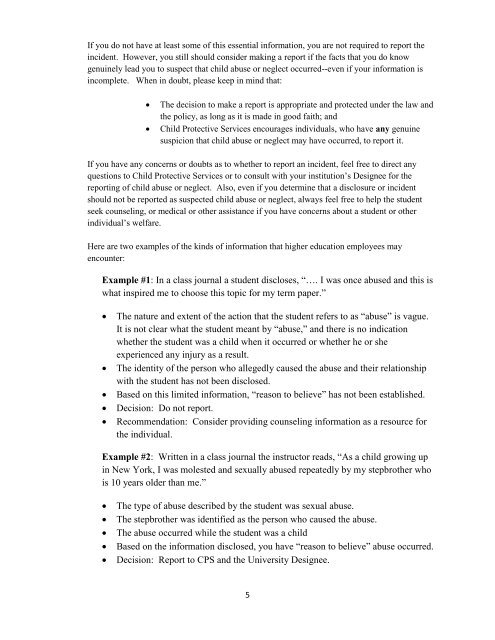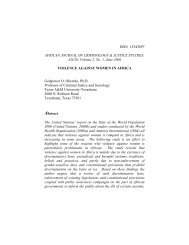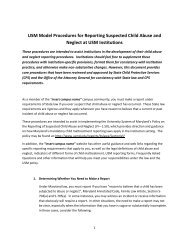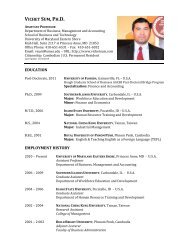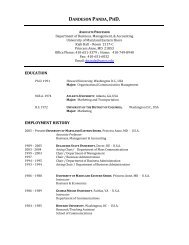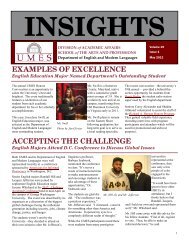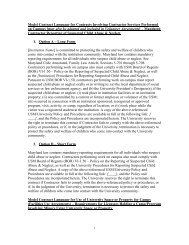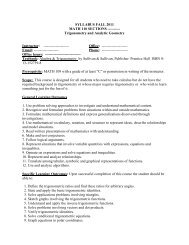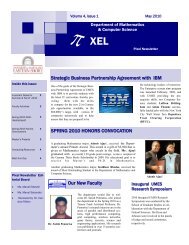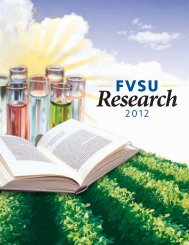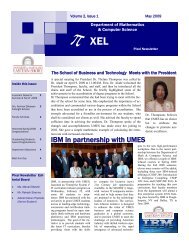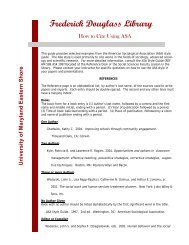Frequently Asked Questions Reporting Child Abuse and Neglect in ...
Frequently Asked Questions Reporting Child Abuse and Neglect in ...
Frequently Asked Questions Reporting Child Abuse and Neglect in ...
Create successful ePaper yourself
Turn your PDF publications into a flip-book with our unique Google optimized e-Paper software.
If you do not have at least some of this essential <strong>in</strong>formation, you are not required to report the<br />
<strong>in</strong>cident. However, you still should consider mak<strong>in</strong>g a report if the facts that you do know<br />
genu<strong>in</strong>ely lead you to suspect that child abuse or neglect occurred--even if your <strong>in</strong>formation is<br />
<strong>in</strong>complete. When <strong>in</strong> doubt, please keep <strong>in</strong> m<strong>in</strong>d that:<br />
<br />
<br />
The decision to make a report is appropriate <strong>and</strong> protected under the law <strong>and</strong><br />
the policy, as long as it is made <strong>in</strong> good faith; <strong>and</strong><br />
<strong>Child</strong> Protective Services encourages <strong>in</strong>dividuals, who have any genu<strong>in</strong>e<br />
suspicion that child abuse or neglect may have occurred, to report it.<br />
If you have any concerns or doubts as to whether to report an <strong>in</strong>cident, feel free to direct any<br />
questions to <strong>Child</strong> Protective Services or to consult with your <strong>in</strong>stitution’s Designee for the<br />
report<strong>in</strong>g of child abuse or neglect. Also, even if you determ<strong>in</strong>e that a disclosure or <strong>in</strong>cident<br />
should not be reported as suspected child abuse or neglect, always feel free to help the student<br />
seek counsel<strong>in</strong>g, or medical or other assistance if you have concerns about a student or other<br />
<strong>in</strong>dividual’s welfare.<br />
Here are two examples of the k<strong>in</strong>ds of <strong>in</strong>formation that higher education employees may<br />
encounter:<br />
Example #1: In a class journal a student discloses, “…. I was once abused <strong>and</strong> this is<br />
what <strong>in</strong>spired me to choose this topic for my term paper.”<br />
<br />
<br />
<br />
<br />
<br />
The nature <strong>and</strong> extent of the action that the student refers to as “abuse” is vague.<br />
It is not clear what the student meant by “abuse,” <strong>and</strong> there is no <strong>in</strong>dication<br />
whether the student was a child when it occurred or whether he or she<br />
experienced any <strong>in</strong>jury as a result.<br />
The identity of the person who allegedly caused the abuse <strong>and</strong> their relationship<br />
with the student has not been disclosed.<br />
Based on this limited <strong>in</strong>formation, “reason to believe” has not been established.<br />
Decision: Do not report.<br />
Recommendation: Consider provid<strong>in</strong>g counsel<strong>in</strong>g <strong>in</strong>formation as a resource for<br />
the <strong>in</strong>dividual.<br />
Example #2: Written <strong>in</strong> a class journal the <strong>in</strong>structor reads, “As a child grow<strong>in</strong>g up<br />
<strong>in</strong> New York, I was molested <strong>and</strong> sexually abused repeatedly by my stepbrother who<br />
is 10 years older than me.”<br />
<br />
<br />
<br />
<br />
<br />
The type of abuse described by the student was sexual abuse.<br />
The stepbrother was identified as the person who caused the abuse.<br />
The abuse occurred while the student was a child<br />
Based on the <strong>in</strong>formation disclosed, you have “reason to believe” abuse occurred.<br />
Decision: Report to CPS <strong>and</strong> the University Designee.<br />
5


